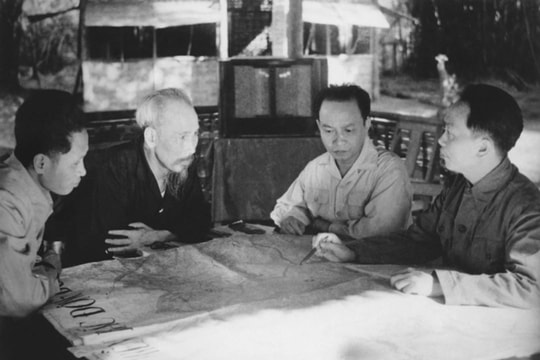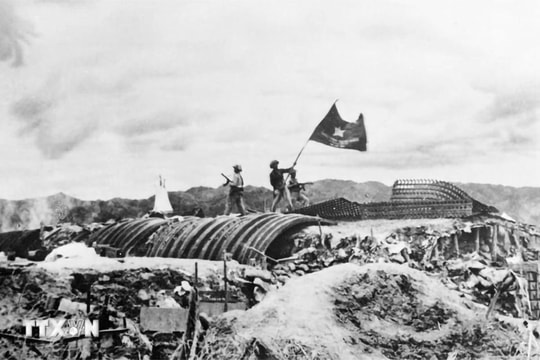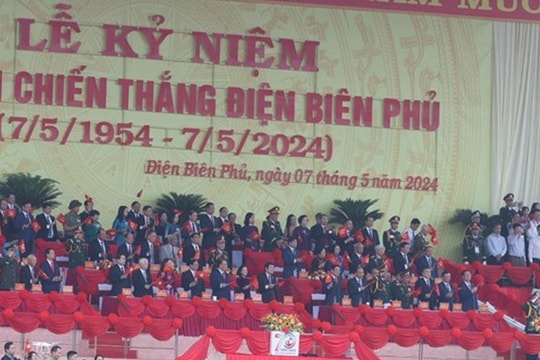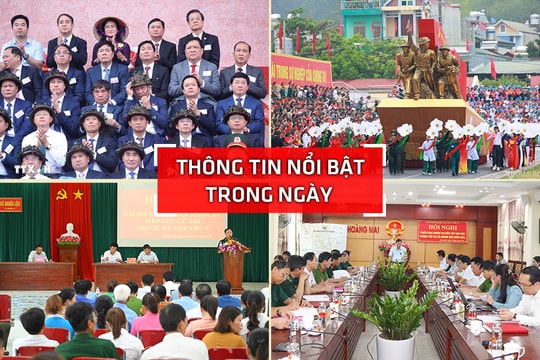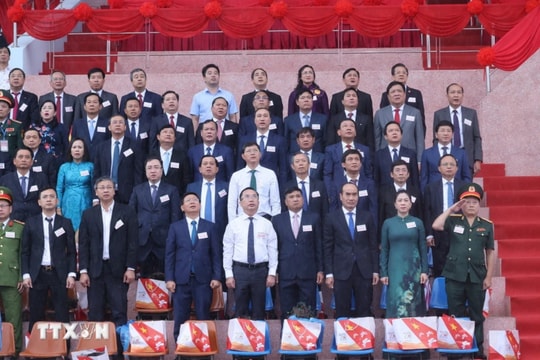President Ho Chi Minh and the Dien Bien Phu Campaign
(Baonghean.vn) - In order to solve strategic issues in the final stage of the resistance war against French colonialism, in September 1953, the Politburo met under the chairmanship of President Ho Chi Minh.
At this meeting, the Politburo discussed and unanimously approved the combat plan for the 1953-1954 Winter-Spring Campaign. At this meeting, on behalf of the General Military Commission, General Vo Nguyen Giap presented the policy, motto, and combat plan for the 1953-1954 Winter-Spring Campaign. In the closing session, Uncle Ho emphasized: "The General Military Commission must have a long-term plan in all aspects to deal with the enemy on the national battlefield. In terms of direction of operation, the Northwest must be the main direction, and other directions must be coordinated. The main direction is currently unchanged, but it can change in operation. The method of using troops must be flexible."
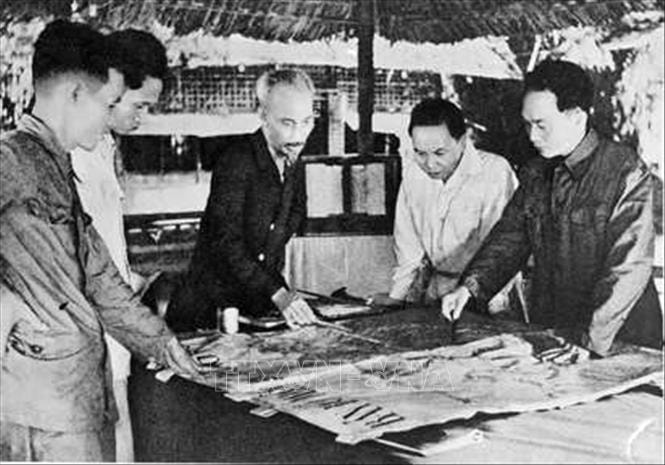 |
| President Ho Chi Minh met with the Party Central Committee Standing Committee to decide to launch the Border Campaign (1950). Photo: Archive/VNA |
Nearly 3 months later, on December 6, 1953, President Ho Chi Minh and the Politburo approved the operational plan and decided to launch the Dien Bien Phu Campaign, determining that this campaign would be the decisive battle to end the resistance war against France. He instructed Commander-in-Chief Vo Nguyen Giap:''This campaign is a very important campaign not only militarily but also politically, not only domestically but also internationally. Therefore, the entire people, the entire army, and the entire Party must concentrate on completing it successfully'.Also in that meeting, Uncle Ho and the Politburo decided to establish the Command and Party Committee of Dien Bien Phu front with comrade Vo Nguyen Giap - Commander and Party Secretary. Only 10 days later, in mid-December 1953, Uncle Ho sent his first letter to the cadres and soldiers of Dien Bien Phu front:“Dear officers and soldiers of Dien Bien Phu front. Last year, you fought bravely and destroyed many enemies. This year, you must fight more bravely, endure more hardships, maintain your determination in all circumstances, and be determined to destroy the enemy and gain many victories.” Uncle Ho's letter promptly encouraged the spirit and fighting spirit of our troops in the Dien Bien Phu Campaign.
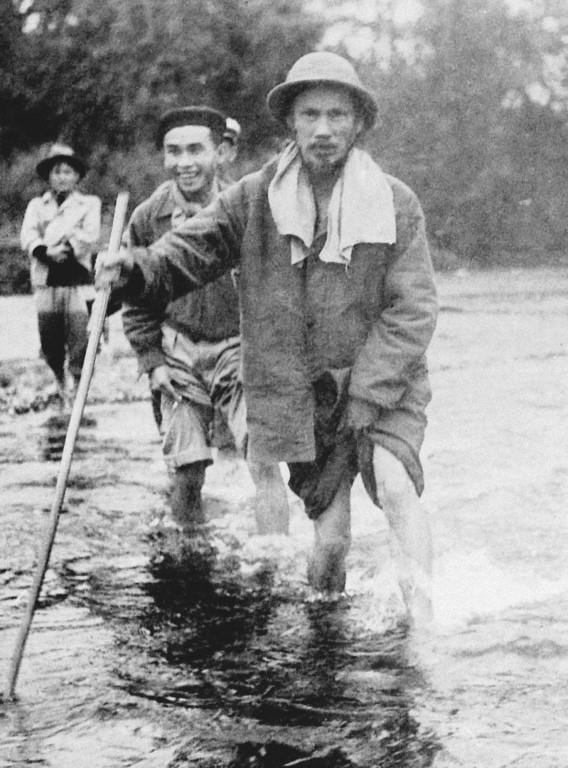 |
| President Ho Chi Minh on a working trip to Viet Bac (1951). Photo: VNA archive |
When sending General Vo Nguyen Giap off to the front, Uncle Ho repeatedly advised:“The Commander-in-Chief is at the Front, the general is abroad. Give him the right to decide. If there are any difficulties, discuss them with the Party Committee, agree with the advisor, then decide and report later. This battle is important, we must fight to win! If we are sure of victory, we will fight, if we are not sure of victory, we will not fight.” That important opinion of Uncle Ho is the basis, the foundation,is the guiding ideology for the General to handle in the actual process of commanding the Dien Bien Phu Campaign.
The General told the People's Army Newspaper reporter:“Because of the supreme leader's high trust in me, I had to make the most difficult decision in my life as a general. When some comrades in the Dien Bien Phu Front Command suggested that we should fight quickly and resolve the situation quickly, I took Uncle Ho's advice as a guideline for my actions, so I decided to change the motto from "fight quickly, win quickly" to "fight firmly, win firmly" (Excerpt from the article "General Vo Nguyen Giap answers an interview with the People's Army Newspaper commemorating the 10th anniversary of the Dien Bien Phu victory", People's Army Newspaper, issue dated May 7, 1964). And we see that the victory of the Dien Bien Phu Campaign proved the General's decision above to be correct. Through this incident, we learn from Uncle Ho a profound lesson in using people, in choosing people to assign important tasks; in the work of using cadres and the absolute trust of the supreme leader in the cadres who have been entrusted with important tasks.
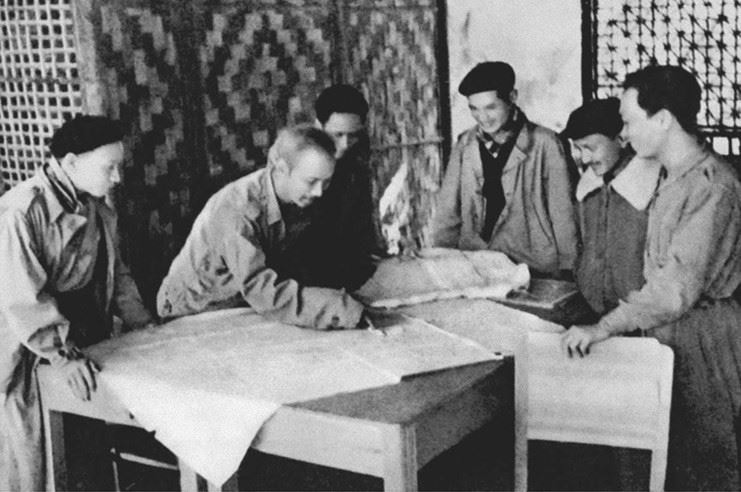 |
| The Party Central Committee decided to launch the Border Campaign (1950). Photo: Archive/VNA |
Although busy with thousands of national affairs, he still directly monitored, directed and encouraged our army and people from the beginning to the end of the Dien Bien Phu Campaign. As soon as the campaign was about to begin, he sent a letter to the troops in Dien Bien Phu: "You are about to go to the front. Your mission this time is very great, difficult but also very glorious. I firmly believe that you will promote the recent victories, determined to overcome difficulties and hardships to fulfill the upcoming glorious mission.".And Uncle Ho decided to give each Regiment a "Determination to fight and victory" flag to use as a rotating award flag.
On March 13, 1954, the Dien Bien Phu Campaign began. Right after our army destroyed the Him Lam stronghold, on March 15, 1954 (just 2 days later), he sent a telegram praising the Dien Bien Phu soldiers:“Uncle Ho and the Party Central Committee were informed of the first victory of our Army in Dien Bien Phu. Uncle Ho and the Party Central Committee praised you comrades. Do not be subjective and underestimate the enemy, determined to win total victory for this campaign." Thus, he closely followed the situation of Dien Bien Phu every day, every hour, promptly bringing to the cadres and soldiers great strength and confidence in the final victory of the campaign.
At exactly 5:30 p.m. on May 7, 1954, our soldiers captured the enemy's Command Headquarters, captured Major General De Castries (Commander-in-Chief) and the entire enemy Command Headquarters at the Dien Bien Phu stronghold. The Dien Bien Phu campaign was a complete victory. The "Determination to fight, determination to win" flag flew on the roof of the enemy Command Headquarters bunker. Upon hearing the news of the victory, Uncle Ho decided to award the "Dien Bien Phu Soldier" badge to all the soldiers who participated in the campaign. On May 8, 1954 (just one day after the victory), he wrote a letter of praise: "Our army liberated Dien Bien Phu. Uncle Ho and the Government cordially send our compliments to the cadres, soldiers, laborers, youth volunteers and local people who have gloriously fulfilled their duties."
Thus, Uncle Ho closely followed every development of the Dien Bien Phu Campaign, promptly encouraged and motivated the cadres and soldiers. Not only that, he also wrote stories about Dien Bien Phu published in the newspapers.National Salvation,like stories"Lies in the sky"i, remainderohi landI hear'', "The French internal affairs are messy", "From the borderi đunmarketablen GoBien Phu"...He also wrote a poem published in the People's Newspaper issue dated May 12, 1954:"For more than 50 days we foughtnoise/ We occupy gravest dnoise, grave againt dnoisy/ The enemy resisted very hardour armybrave as few/ Na-va, Co-nhiDThe enemy's face was distorted/ The enemy's army was devastated, we surrounded them tightly/ The enemy came out in series to surrender to us/ Our army happily sang "Kha""I'm done singing"/ Muyeahthree years agomany goodst/ Private nameThe Commander was also imprisoned/ Sixteen thousand banditsWest/EastAll are prisoners or dead/is our army"Total victory".
It can be said that Uncle Ho not only directly commanded the Dien Bien Phu Campaign together with the Politburo, but he also closely followed the campaign's developments, regularly visited and encouraged cadres and soldiers. As General Secretary Nong Duc Manh said at the 50th anniversary of the Dien Bien Phu victory (1954-2004): "The Dien Bien Phu victory was closely associated with the role and name of the great President Ho Chi Minh"./.

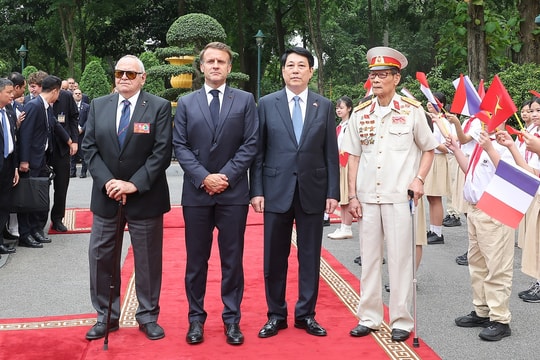
.jpg)
